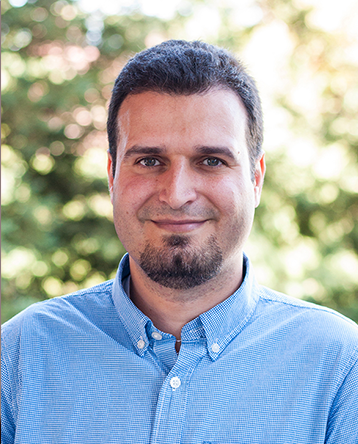NextM Seminar: Amir Barati Farimani
August 30, 2023
12:30 p.m. - 1:30 p.m. ET
Scott Hall 6142
August 30, 2023
12:30 p.m. - 1:30 p.m. ET
Scott Hall 6142

Next Manufacturing Center seminars are open to Center members, as well as other interested members of the CMU community. Next Manufacturing Center Consortium members are able to participate online.
Title: Characterizing spatter particle dynamics through high resolution simulations, deep learning, and experiments
Speaker: Amir Barati Farimani, associate professor, mechanical engineering
During Laser Powder Bed Fusion, a molten product is created by using a heat source to fuse successive layers of metallic powder in specific cross-sections to produce a three-dimensional component. However, the usage of Laser Powder Bed Fusion techniques for high-precision applications is limited by the stochastic nature of spatter ejection. These ejected particles can hinder the ability of the laser to form a consistent molten layer during production, causing lack of fusion defects and surface roughness. Experimental methods have been used to track the spatter particles to extract the size, shape, and motion of particles as they are ejected for a better understanding of the link between the process and structure relationships. However, these observations are limited to 2-D geometrical information, and the measurement of internal spatter properties is difficult due to the length and timescales involved. High resolution simulations have been shown to recreate the ejection of spatter during the melting process, but simulations capable of resolving this phenomenon are computationally expensive. This project leverages deep learning and data-driven statistical methods to fuse experimental observations of spatter with morphology information available through high resolution simulations. The successful fusion of these two data sources will enable greater insight into the physical properties of the particles ejected during spattering events, and how these properties may impact the final build. Generative models are used to create new candidates of spatter particles based on the bulk distribution observed during simulation, to augment the dataset and reduce the number of simulations required to generate a diverse array of particle types. We use the ejected velocity and angles as observable from experiments to find their counterpart instances in simulations using machine learning and by matching the statistical particle distributions.
Amir Barati Farimani received his Ph.D. in 2015 in mechanical science and engineering from the University of Illinois at Urbana-Champaign. His Ph.D. thesis was titled “Detecting and Sensing Biological Molecules using Nanopores.” He extensively used atomistic simulations to shed light on the DNA sensing and detection physics of biological and solid state nanopores. Farimani’s lab, the Mechanical and Artificial Intelligence Laboratory (MAIL), at Carnegie Mellon University is broadly interested in the application of machine learning, data science, and molecular dynamics simulations to health and bio-engineering problems. The lab is inherently a multidisciplinary group bringing together researchers with different backgrounds and interests, including mechanical, computer science, bio-engineering, physics, material, and chemical engineering. The mission is to bring the state-of-the-art machine learning algorithms to mechanical engineering. Traditional mechanical engineering paradigms use only physics-based rules and principles to model the world, which does not include the intrinsic noise/stochastic nature of the system. To this end, the lab is developing algorithms that can infer, learn, and predict the mechanical systems based on data. These data-driven models incorporate the physics into learning algorithms to build more accurate predictive models. They use multi-scale simulation (CFD, MD, DFT) to generate the data.
February 17 2026
9:00 AM - 4:00 PM ET
Virtual
February 26 2026
12:30 PM ET
Next Manufacturing
New faculty highlight with Liwei Wang, Assistant Professor, Mechanical Engineering
Scott 6142
March 23 2026
12:30 PM ET
Next Manufacturing
New faculty highlight with Francis Ogoke, Assistant Professor, Mechanical Engineering
Scott 6142
April 6 2026
12:00 PM ET
Next Manufacturing
New faculty highlight with Misha Khrenov, Ph.D. Candidate, Mechanical Engineering
Scott 6142
April 24 2026
10:00 AM ET
Next Manufacturing
Yash Parikh, Ph.D., Process Engineering Consultant, EOS North America
TBD